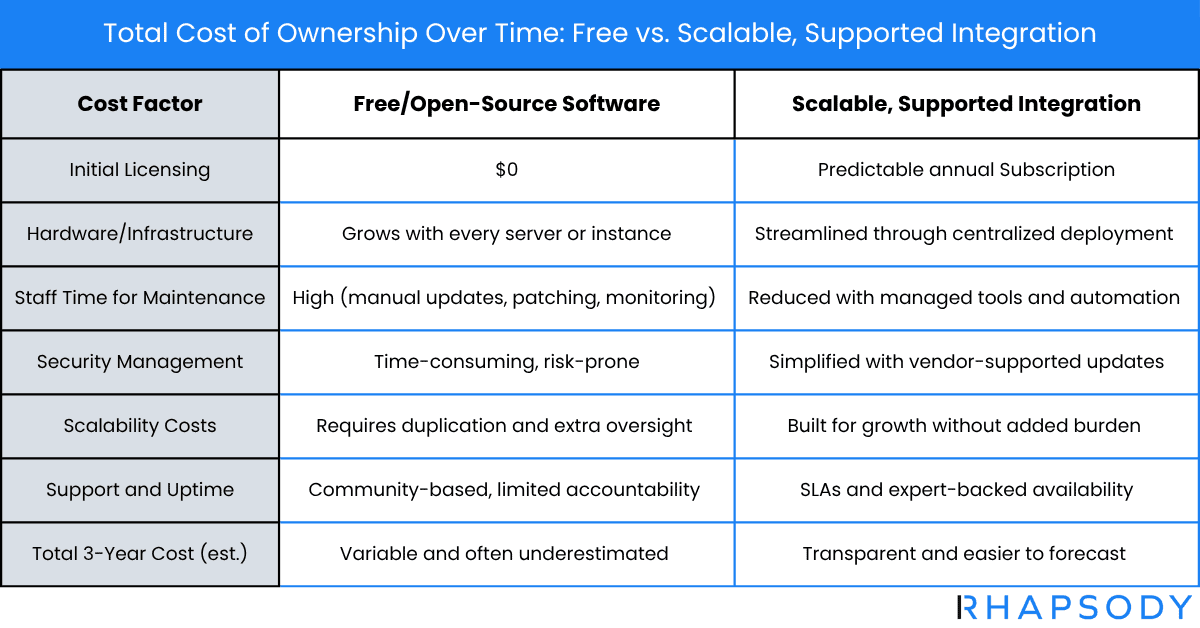We’re all familiar with the adage “there’s no such thing as a free lunch.” In healthcare integration, that rings especially true. Free or open-source tools can seem cost-effective upfront, but tradeoffs often surface as systems grow in scale and complexity. Across healthcare and health tech, organizations facing tighter budgets and limited resources are taking a closer look at their integration strategy. Many are choosing solutions that offer long-term value, reliability, and the flexibility to grow with their needs.
The Hidden Price Behind Open-Source Tools
Open-source or free software can seem cost-effective at first glance, but when it comes to interoperability and integration, the true cost is rarely free. A modern, enterprise-grade digital health enablement platform with a transparent annual subscription often delivers better value over time.
While the upfront savings may be appealing, switching to a supported integration solution typically results in more predictable and sustainable costs. Here’s how the comparison plays out:

When Infrastructure Growth Becomes a Liability
The ability to scale is critical for any company’s growth. Every healthcare technology leader aims to add data exchange partners and new internal systems, all requiring data exchange capabilities. They also want to keep their internal customers happy and their technology running smoothly without having to add new IT resources or more staff.
There’s a tipping point when open-source solutions can become a problem. At a certain threshold, an organization will max out their software and then replicate it on an additional server. And with time and more growth, they replicate on another server, and another one, and need more resources. New cloud instances or hardware costs begin to add up, and, as they do, the cost of free software becomes more expensive infrastructure.
The Real Impact on Engineering and IT Teams
Another aspect of cost that free software overlooks is the burden placed on IT and administrative staff. As the number of servers and cloud instances increases, it can become too much for the existing staff to manage and monitor. Often, this leads to:
- Multiple servers with individual logins
- Disconnected systems that don’t communicate
- Separate monitoring dashboards for each environment
What starts as “free” quickly turns into costly, fragmented maintenance and overhead. Integration and data management work can be tedious, time-consuming, and just one of many responsibilities someone may juggle. This impact is especially clear in the two common scenarios listed here:
- In a startup, there may be only one or two software engineers. If they’re spending hours on integration or data quality tasks, that’s time pulled away from high-value work like product development or innovation.
- In a resource-constrained health system, IT staff often find themselves managing unfamiliar integration or data clean-up tasks. Instead of driving operational improvements or supporting clinical workflows, they’re bogged down by technical debt and can’t focus on improving operational clinical efficiencies.
The Security Risks That Add Up Over Time
One often overlooked cost of free software is security. As server sprawl increases, so does the risk. Organizations often face:
- Manual patching across multiple servers
- Inconsistent upgrades that depend on individual attention
- Security updates that become an afterthought—or get skipped entirely
Unpatched systems are more vulnerable to threats and attacks, especially if they have direct internet access. What started as free software can quickly lead to legal fees, ransom demands, and potential loss of customer trust.
The Power of a Single Predictable Platform
With Rhapsody, customers have a fixed cost for their integration software. They also have a fully-integrated single platform that can accommodate over 40 protocols like FHIR, HL7, SOAP, REST, JSON, and custom APIs. Customers get what they need, when they need it, and know their cost up-front.
To learn more about how Rhapsody can simplify your integration strategy or to request a tailored quote, connect with our team today.
The Scalable Integration Success Equation
Every healthcare organization faces the same essential challenge: how to grow, innovate, and improve care experiences while managing increasingly complex systems and data demands. Scalability in healthcare integration is no longer just about handling more connections or larger data volumes. It is about building an adaptable ecosystem that can evolve with changing needs, technologies, and expectations.
True scalability takes more than technology. It requires the right balance of flexibility, data integrity, efficiency, and trust. That equation includes:
1. A Reliable Interoperability Platform: A modern foundation capable of supporting diverse standards, adapting to new technologies, and scaling seamlessly as organizations expand. The most resilient architectures are those that enable choice across deployment models, governance structures, and integration patterns while maintaining consistency and control.
2. Clean, Connected Data: Reliable, usable data is the lifeblood of healthcare innovation. When information flows freely and accurately across systems, it fuels better decisions, stronger patient outcomes, and new insights that advance care delivery and operational performance.
3. Efficient IT Resources: As technology footprints expand, efficiency becomes a strategic imperative. Sustainable growth depends on freeing internal teams from routine maintenance and manual processes so they can focus on innovation, collaboration, and value creation.
4. Trusted Support Services: The path to interoperability at scale requires collaboration, shared expertise, and long-term partnership. Organizations that combine technology with trusted guidance can accelerate transformation while reducing complexity and risk.
Scalable integration is not simply a technical achievement. It is a strategic enabler of connected, sustainable healthcare. Rhapsody Envoy, together with Rhapsody’s proven integration solutions, helps organizations build that foundation with confidence.
The True Cost of Ownership
Scalability isn’t just about spinning up more instances. It’s about managing growth securely, efficiently, and without overburdening your people. Choosing a vendor whose single suite of solutions has enterprise-grade tools and centralized oversight often proves far more cost-effective in the long run.
Before the appeal of “free” drags down your productivity or exposes your systems to risk, take a closer look at what it really costs to manage interoperability, integration, and data quality at scale.
If you’re reassessing your strategy, now is the time to explore a platform built for long-term success—with the support, security, and scalability to grow with you.
You might also like:

Trust is always the foundation
Rhapsody understands the importance of keeping data secure and is committed to providing secure, stable, reliable, and high-quality solutions for healthcare organizations.

Flexible deployment options: Why it matters
Learn the limitations of cloud only solutions and why you need a solution that meets you where you are for total interoperability in healthcare.
Data privacy at risk: What the Delete Act means for healthcare information
As data privacy regulations continue to expand worldwide, ensuring your EMPI solution uses transparent and traceable data to comply with privacy regulations is crucial.
